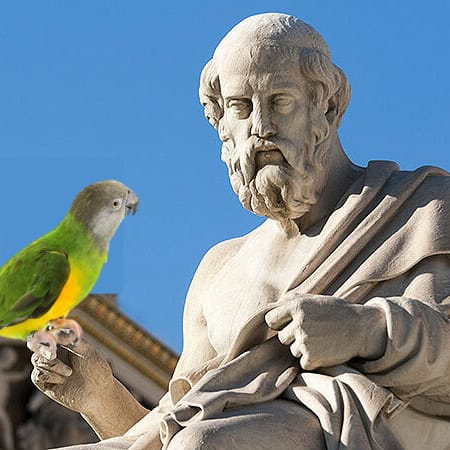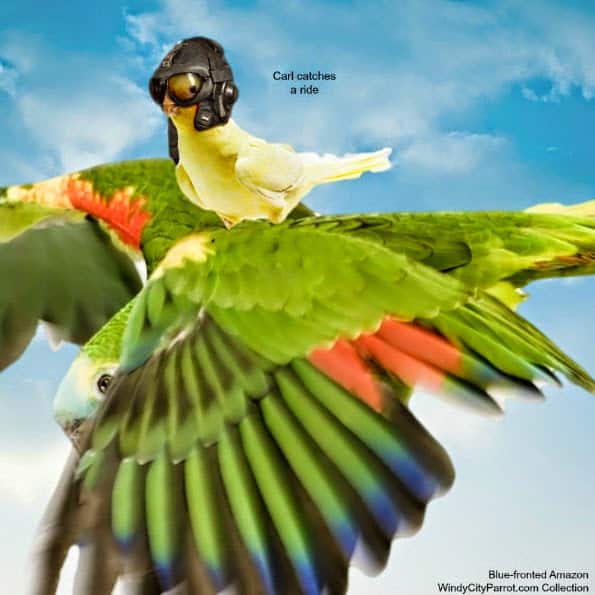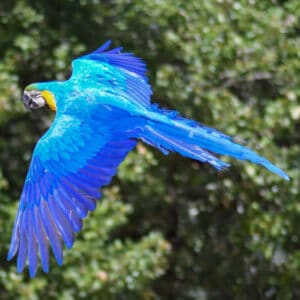Last Updated on by Mitch Rezman
Bird Brains: The Secret to Avian Genius (and Maybe Even Self-Awareness)
When someone calls you a “bird brain,” you might want to take it as a compliment. It turns out that birds are way smarter than we’ve given them credit for—no offense to the pigeons who keep walking into glass doors.
Feathered factoid: Birds do not understand the concept of mirrors or glass ~ you’ve been warned
A groundbreaking discovery has unveiled a curious brain structure in our feathered friends that might explain their surprising intelligence, and, wait for it… their potential self-awareness. Yes, your parrot might just be judging you.
Let’s dive into the science (and the sass).
A Brainy Breakthrough
For years, scientists have been puzzled by how some birds—like crows, ravens, and parrots—manage to pull off feats of intelligence that rival primates.
We’re talking tool use, problem-solving, memory tricks, and even recognizing themselves in mirrors. (Meanwhile, my dog still thinks his reflection is a rival suitor.)
The big mystery was this: bird brains don’t have a neocortex. That’s the fancy layer of wrinkly brain tissue in mammals that handles higher-order thinking.
Without a neocortex, how were birds pulling off these mental gymnastics? Were they hiding tiny graduate degrees under their feathers?
Enter the newly discovered structure: the **mesopallium ventralis**, or as I like to call it, the “Bird Brain Powerhouse.”
Scientists recently found that this part of the avian brain is organized in a way that’s strikingly similar to the mammalian neocortex. Think of it as birds’ secret weapon—a neural shortcut to intelligence that lets them punch above their weight class in the IQ department.
So, How Smart Are We Talking?
Let’s put this into perspective. Crows have been observed crafting tools out of sticks, solving multi-step puzzles, and even holding grudges (which is both impressive and slightly terrifying).
Parrots can mimic human speech, count objects, and understand concepts like “bigger” and “smaller.” Some birds have even demonstrated planning for the future—something humans struggle with every time Netflix asks, “Are you still watching?”
And then there’s the mirror test. This classic experiment is one-way scientists check for self-awareness: does an animal recognize itself in a mirror?
Most animals fail miserably. (Sorry, cats.) But some birds, like magpies, pass with flying colors—literally.
For Plato, self-awareness, or “knowing thyself,” is crucial for achieving virtue and a harmonious soul, as it involves understanding one’s strengths, weaknesses, and desires, ultimately leading to a just and virtuous life.
They’ll preen themselves or try to remove a mark placed on their feathers when they see it in their reflection. That’s not just vanity; that’s self-recognition.
What Does This Mean for Us?
First of all, we need to rethink how we view birds. They’re not just background noise at the park or your breakfast mascot (looking at you, Toucan Sam). These creatures are operating on a level of intelligence that demands respect.
Second, this discovery raises fascinating questions about the evolution of intelligence. It turns out there’s more than one way to build a smart brain.
Mammals and birds took different evolutionary paths but ended up with similar cognitive abilities—a phenomenon called **convergent evolution**. It’s like two chefs creating the same dish with completely different recipes.
Finally, let’s talk about self-awareness. If some birds are truly self-aware, what does that mean for how we treat them? Should we feel guilty about keeping parrots as pets or serving chicken nuggets for dinner? (Okay, maybe don’t think too hard about that last one.)
The Takeaway
Birds aren’t just mindless creatures flapping around—they’re brilliant, adaptable, and maybe even self-aware beings with brains that deserve a standing ovation.
So the next time you see a crow eyeballing you from a tree branch, don’t underestimate it. It might be smarter than you think—and it might be plotting something.
As for the phrase “bird brain”? Let’s retire it as an insult and start using it as a compliment.
After all, who wouldn’t want a brain as clever as a crow’s or as creative as a parrot’s? Just don’t let them hear you say it—they might start demanding equal rights.
Written by Mitch Rezman and the Windy City Parrot content team
Note from Catherine on the topic of birds and mirrors.
My own personal thoughts on a bird’s view on mirrors, is that birds who try to fly through them are actually trying to enter the room or area reflected in the mirror.
I have a very small mirror on the wall above my bed and Barney likes to come visit me, sit on my pillow and look at the mirror.
I think he knows it is his reflection so he ignores that, but he looks at the reflection like he would like to fly to the room within the mirror.
I guess that would be Barney Through The Looking Glass. LOL….Catherine
Author Profile
Latest entries
 Feeding Exotic BirdsDecember 29, 2025How to Switch or Convert Your Bird From Seeds to Pellets: Real-Life Case Studies and Practical Guidance
Feeding Exotic BirdsDecember 29, 2025How to Switch or Convert Your Bird From Seeds to Pellets: Real-Life Case Studies and Practical Guidance Feeding Exotic BirdsDecember 16, 2025A Practical, Budget-Smart Guide to Feeding Birds Well
Feeding Exotic BirdsDecember 16, 2025A Practical, Budget-Smart Guide to Feeding Birds Well Bird EnviornmentsDecember 7, 2025Understanding Budgie Cage Bar Orientation: Myths, Realities & Practical Solutions for Vertical-Bar Bird Cages
Bird EnviornmentsDecember 7, 2025Understanding Budgie Cage Bar Orientation: Myths, Realities & Practical Solutions for Vertical-Bar Bird Cages Feeding Exotic BirdsDecember 5, 2025How Dr. T.J. Lafeber Rewrote the Future of Pet Bird Nutrition
Feeding Exotic BirdsDecember 5, 2025How Dr. T.J. Lafeber Rewrote the Future of Pet Bird Nutrition



